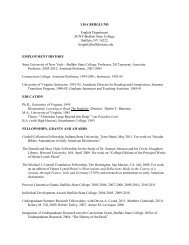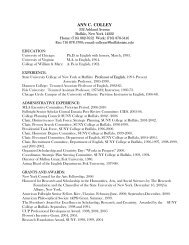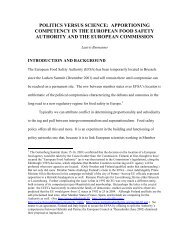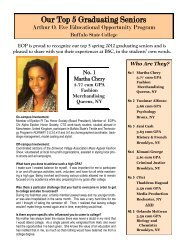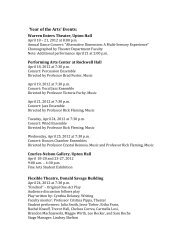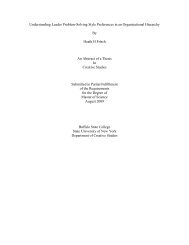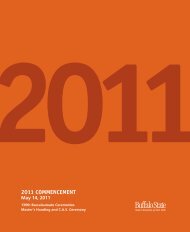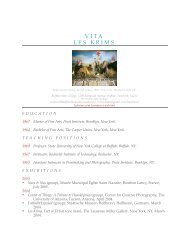Arts - Buffalo State College
Arts - Buffalo State College
Arts - Buffalo State College
Create successful ePaper yourself
Turn your PDF publications into a flip-book with our unique Google optimized e-Paper software.
70<br />
Education<br />
Teacher Candidates: Vital Stakeholders In<br />
Professional Development Schools<br />
Devin Bartlett, Combined Childhood and Early Childhood<br />
Education<br />
Faculty Mentor: Professor Leslie Day, Elementary Education and<br />
Reading<br />
Strong partnerships, robust collaboration, and lively shared<br />
decision-making are important components of the <strong>Buffalo</strong> <strong>State</strong><br />
<strong>College</strong> Professional Development School Consortium. Teacher<br />
Candidates are significant stakeholders in the collaboration,<br />
particularly elected student representatives who play vital roles in<br />
supporting PDS initiatives and the PDS mission. Valuing teacher<br />
candidates’ perspectives strengthens and validates the authentic<br />
nature of PDS. Elected representatives are liaisons to the teacher<br />
candidate student body and support the initiatives of the <strong>Buffalo</strong><br />
<strong>State</strong> <strong>College</strong> PDS. One such initiative is to examine PDS impact<br />
on teacher candidates. Specifically, this poster session will focus on<br />
the impact of attending our annual PDS Retreat, participating in<br />
PDS Consortium meetings, and presenting research and projects<br />
at these venues have on teacher candidates. Teacher candidates are<br />
encouraged to attend the professional development opportunities<br />
provided by the Consortium. This past September, as an example,<br />
over 40 students participated in the annual PDS Retreat. Following<br />
this event, as well as the December consortium meeting, the elected<br />
student representatives designed questionnaires for each event that<br />
was emailed to these teacher candidates using Survey Monkey and<br />
then followed up with hard copy mailing. The results of these surveys<br />
will be shared during this poster session. Monitoring and measuring<br />
the impact PDS has on our teacher candidates and teacher<br />
education program continues to be a focus of our PDS research<br />
agenda.<br />
Presentation Type and Session: Poster III<br />
Teaching 21st Century Thinking Skills<br />
Ismet Mamnoon, Creative Studies<br />
Faculty Mentor: Professor Cyndi Burnett, Creative Studies<br />
As we navigate through the 21st century, there is a growing<br />
awareness that there is a critical need for innovation and creative<br />
thinking. The USA stands to lose its place in the world as the leader<br />
in innovation and discovery. Change is coming from all sides at break<br />
neck speed and we are running to stand still. The future generation<br />
needs a new skill set in order to survive and thrive in this new world.<br />
This skill set is the ability to think creatively. Teachers are now being<br />
asked to develop these skills in their students. The problem that<br />
arises is, how can educators teach these 21st Century Thinking Skills<br />
unless they have a strong understanding of what these skills are? The<br />
Teaching for Creativity program was developed to meet this pressing<br />
need in the field of education. It is a program designed specifically<br />
for educators and the goal of the program is that teachers will be<br />
able to: define creativity; recognize creative behavior and outcomes;<br />
identify and develop key affective skills related to creative leadership;<br />
establish a classroom environment in which creativity flourishes;<br />
and facilitate with and teach creative thinking and problem solving.<br />
This program has been used for professional development in schools<br />
internationally. There has been a significant positive impact on<br />
students. It is hoped that this program will become a mandatory<br />
requirement for all teachers in the future.<br />
Presentation Type and Session: Poster II<br />
Technology In Schools: Harmful Or Helpful<br />
Joanna Cianciosa, HON 400: All <strong>College</strong> Honors Colloquium<br />
Faculty Mentors: Professor Leslie Day, Elementary Education and<br />
Reading and Professor Andrea Guiati, Director, All <strong>College</strong> Honors<br />
Program<br />
Technology has vastly changed our education system over the<br />
years. New technology is slowly working its way into the education<br />
system and changing the way students learn and teachers teach.<br />
This change seems to have taken place overnight. All of a sudden<br />
classrooms are equipped with things such as SmartBoards and<br />
iPads. Ten years ago this technology did not even exist. With my<br />
research I am going to explore just how technology has impacted the<br />
classroom. I will look at how it was when I attended elementary and<br />
middle school compared to how lessons are taught in the classroom<br />
today. I will also see if grades and performance have improved with<br />
this new technology being used in the classroom. Most people say<br />
technology is one of the best things to happen to a classroom and<br />
I will seek to shed some light on whether this theory is right or<br />
wrong. From pre-k up until high school, the past ten years have seen<br />
technology completely overhaul the education system, but is it for<br />
better or for worse?<br />
Presentation Type and Session: Poster IV<br />
Undergraduate Learning Assistants In a<br />
Hybrid Economics Course<br />
Heather Dennis, Liza Sang Yan, Amber Buchholz, Daniel<br />
Flaherty, Katelyn Reese, Chanil Mejia, Cory Lauber,<br />
Joshua Naughton, Brittany Leo, and April Musielak,<br />
ECO 101: The Economics System<br />
Faculty and Staff Mentors: Professor William Ganley, Economics<br />
and Finance and Ms. Meghan Pereira, Instructional Resources<br />
Economics 101 is a hybrid course that combines classroom<br />
instruction with informational technologies, such as ANGEL. The<br />
responsibilities of the Undergraduate Learning Assistants are to<br />
manage online activities, for example discussion forums, quizzes,<br />
and ToonDoo. In addition, ULA’s track the progress of students<br />
and provide office hours for additional help. ANGEL is used in a<br />
variety of ways. We have weekly online discussion forums where the<br />
students post a response to their peers’ questions. This is a good way<br />
for students to think critically about course material and to help<br />
others in the class to engage in critical thinking. Quizzes assigned<br />
to students have unlimited timing, and serve as resources to study




